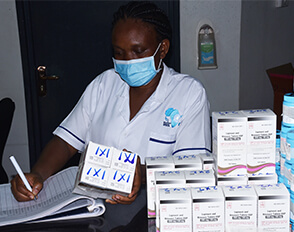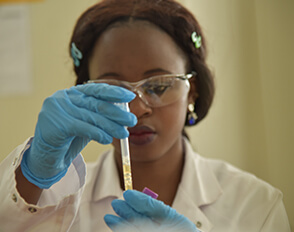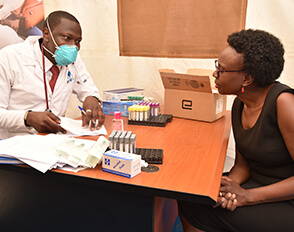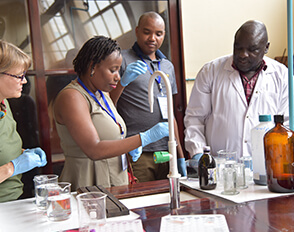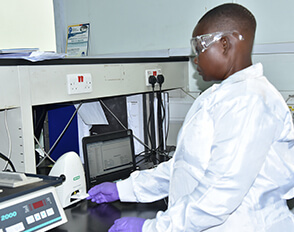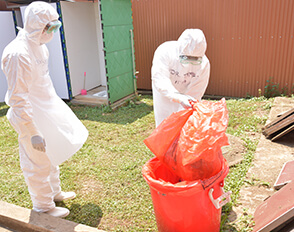
Research Units
The Clinical Trials Unit (CTU) supports the implementation of clinical trials at IDI. An average of over 20 ongoing trials ranging from Phase II to Phase IV studies, and consisting of both investigator/institution-initiated studies and industry-sponsored studies clinical trials are supported by the unit. The current trials include pharmacokinetics studies, randomised trials and post marketing studies covering HIV, malaria, TB and other infectious diseases. The units’ primary role is: to provide recommendations for development and management of trials, to offer support services (regulatory compliance, IRB help, internal monitoring), to develop research standard operating procedures (SOPs), and review compliance and progress of all clinical trials at IDI.
Longitudinal Cohorts Unit
The longitudinal cohorts unit at IDI was formed to bring all observational studies at IDI under one umbrella in order to ensure uniformity and quality of data collected, to enforce compliance with ethical standards and to oversee adherence to standard operating procedures for analysis and publication. IDI cohorts encompass over 70,000 patients with routinely collected electronic HIV prevention care and treatment data. The cohorts cover both ART active and naïve patients and rural and urban populations. Sub-cohorts have been created to accommodate and collect additional data on special groups of interest to various research groups such as young adults, pregnant mothers, patients co-infected with tuberculosis, patients with Kaposi’s sarcoma, and patients in discordant relationships. The unit has a team that is dedicated to quality assurance and quality control. In 2011 the unit was named an African Network for Drugs and diagnostic Innovations (ANDI) “Center of excellence in epidemiology of infectious diseases” through a competitive criteria based process.
Translational Research Diagnostic Laboratory
The Translational Research Laboratory at the Infectious Diseases Institute has been running since June 2009. In 2014, with the assistance of generous financial support from UCSF-GIVI CFAR and in partnership with the Obstetrics and Gynecology Department at Makerere University, the Laboratory began operating in a new laboratory space four times the size of the original one. This new space has been provided with additional scientific equipment allowing a wider range of assays to be conducted in the Laboratory, from routine diagnostics to highly complex microbiological, immunological and molecular biological assays. From 2013-2015 the Laboratory has collaborated with internationally renowned universities in support of numerous research projects employing six full time laboratory technologists; all of these projects have the potential to lead to better treatment options for patients in Uganda and worldwide.
Database Collaborations
IDI is part of two major research database collaborations. IDI contributes to The East African International epidemiologic Databases to Evaluate AIDS (EA IeDEA) research consortium which uses observational databases to support research on different HIV manifestations and identify optimal treatment and prevention strategies in diverse resource-replete settings. Through this collaboration, The East Africa Regional Data Center (RDC) conducts periodic data quality and monitoring visits to offer guidance on quality to Investigators and Data Managers. IDI also contributes to the East African Consortium for Clinical Research (EACCR), an EDCTP-supported initiative. Through this collaboration IDI is building capacity for TB research at St Mary’s Lacor hospital in Gulu district by supporting TB data management and laboratory upgrading.
Health Economics and Outcomes Research Group
IDI is rapidly developing its internal capacity to conduct health economics and outcomes research related to infectious diseases that disproportionately affect sub-Saharan Africa in order to inform the optimal allocation of scarce resources so as to obtain the greatest value from health expenditures. The group has conducted studies in a wide and rapidly growing range of areas including tuberculosis therapy, early initiation of antiretroviral therapy, the use of antiretroviral regimens for the prevention of mother-to-child transmission of HIV and evaluation of syphilis screening using immunochromatographic tests, among others. The unit worked with faculty and students of Makerere University to set up the Uganda chapter of the International Society for Pharmacoeconomics and Outcomes Research (ISPOR). The ISPOR Uganda secretariat is now located within the IDI Research Office and the unit benefits from its presence through access to materials and through joint training activities. ISPOR membership is available free of charge to Ugandan residents.

